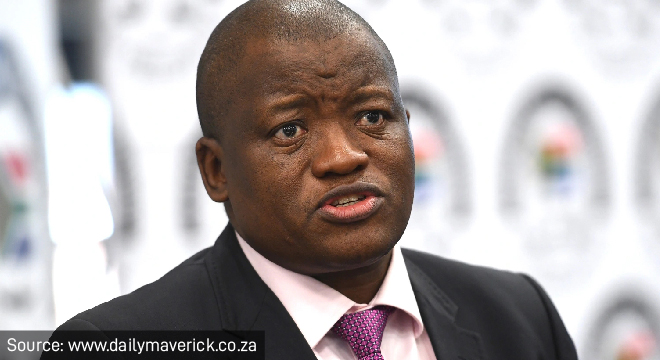Former National Treasury director-general Lungisa Fuzile says President Jacob Zuma became increasingly unhappy with Pravin Gordhan and Nhlanhla Nene because they were unwilling to sign off on decisions that risked the fiscus and the country’s sovereignty.
Fuzile’s allegations are contained in a sworn statement submitted to the Judicial Commission of Inquiry into State Capture.
Part 4 of the commission’s report, which was released on Friday, said Fuzile’s evidence was undisputed, except in relation to matters pertaining to Des van Rooyen.
Van Rooyen was Minister of Finance for four days in December 2015 after Zuma dismissed Nene. After the markets reacted extremely negatively to his appointment, Zuma decided that Van Rooyen would switch positions with Gordhan, who was the Minister of Co-operative Governance and Traditional Affairs.
Volume 1 of the report deals with the attempted capture of National Treasury, EOH Holdings and the City of Johannesburg, and Alexkor.
Fuzile joined what was then called the Department of Finance as a deputy director in 1998. This department was merged with the Department of State Expenditure to form National Treasury in 2001.
He became the director-general in 2011, when Gordhan was Minister of Finance. He resigned a few days before the appointment of Malusi Gigaba in March 2017.
‘Zuma believed Treasury was failing him’
In his statement, Fuzile said he started to hear rumours in the second half of 2015 that Zuma was “very unhappy” with the budget process and the budget.
According to Fuzile, in November of that year, he met with Khulekani Mathe, who was then the head of planning at the National Planning Commission (NPC). Mathe told him about discussions that had taken place at the Presidency and the NPC about the budget process and Treasury.
Fuzile said it emerged from this meeting that there was “wide sharing of sensitive budget documents with people ‘outside’ government who were not involved with the budget process”. In his view, these documents were “inappropriately used to show misalignment between the budget and the National Development Plan”.
Mathe told him that Zuma had expressed “grave dissatisfaction” with Treasury.
He was told that Zuma had asked the NPC to present him with evidence that confirmed that Treasury was failing him, indicating that he would not hesitate to act. He apparently said, “I will shake the tree. If it fall, so be it.”
“I asked Mr Mathe what he understood this to mean. He said that he thought the president was readying himself to fire Mr Nene and possibly some of us (senior members of the Treasury). From the way Mr Mathe said this, it was as though it might happen soon.
“Given that it was November, I thought it was implausible. I was clearly wrong. Mr Nene was removed about a month later.”
Treasury was a ‘stumbling block’ to state capture
Fuzile said he witnessed Zuma’s growing dissatisfaction with Treasury – in particular, Gordhan and Nene. The main reason for this dissatisfaction was their unwillingness to sign off on decisions that risked the fiscus and sovereignty.
The areas of conflict between the ministers and Zuma were the procurement of nuclear power; PetroSA’s acquisition of a significant share in, or all of, Engen; financial and governance decisions at SAA; the contract for the payment of social security grants; the deal between Denel and VR Laser Asia; and the closure of the Guptas’ bank accounts.
Fuzile said that, when taken together, the circumstances relating to these issues, showed that:
- The Ministry of Finance and Treasury became a stumbling block to the erosion of due process and decision-making by the state.
- The Ministry of Finance and Treasury (sometimes with support from some members of Cabinet and officials in relevant departments) played a role in stopping or delaying some of the decisions that would have had dire consequences for South Africa, fiscally and otherwise, including by elevating the debt burden on future generations.
- In some cases, the government’s decision-making processes were changed or deliberately manipulated to achieve decisions that were not in the national interest or in the interest of specific institutions.
Treasury was ‘a scapegoat’
During Zuma administration, the country was beset by low economic growth, while poor revenue performance made resource allocation even more challenging.
Fuzile said the Zuma administration was characterised by an unwillingness to face up to the reality that budgeting is about making hard choices. There was “overriding desire” to announce new programmes without curtailing or terminating old and poorly performing ones.
“Treasury was repeatedly expected to just find the money to fund more and more new programmes. With the imposition of an explicit expenditure ceiling, it became harder and harder to add new programmes without stopping others, and this bred resentment and saw Treasury being used as a scapegoat for the constrained fiscal situation.”
What was largely a macroeconomic problem was “conveniently made out to be the fault of a few individuals”, particularly those in Treasury, Fuzile said.
“Those who asked tough questions were labelled as enemies of (a somewhat distorted form of) radical economic transformation in an attempt to silence them, even if asking the questions was their core job.”
He said the rhetoric of promoting transformation was used to mask the “insidious objective” of repurposing the state to enable rent-seeking.



